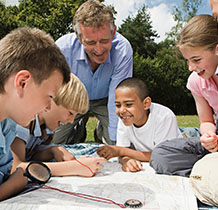Resource Database

Click on a topic or use the search box below to look for a listing:
There are 488 resources. Displaying 10 resources per page.
Provided by the U.S. Department of Education’s 21st CCLC web portal, this You for Youth online professional learning course explores ways to incorporate college and career readiness into 21st CCLC afterschool and summer programs. Learn how to use existing activities to build and reinforce skills, work with stakeholders to strengthen your program, tap into various funding sources, and help families become more informed.
View Resource
This video from the American Youth Policy Forum features the stories of several first-generation college students and graduates, and explores their challenges, sources of support, and recommendations for policymakers. A related article provides additional information on the types of support that helps first-generation college students make it to and through college and includes links to related resources. Afterschool programs can use these resources independently or collaborate with schools to determine how to best support the students in their programs.
View Resource
What qualities do children need to develop to be prepared for success in adult life? Drawing on research from several fields, University of Chicago researchers identify self-regulation, knowledge and skills, mindsets, and values. A developmental framework illustrates that some qualities are especially important to develop during certain stages of childhood. The report addresses how parents, teachers, and afterschool professionals can foster children’s growth in ways that lead to college and career readiness, healthy relationships, and engaged citizenship. Download the full report, a research brief, and a framework infographic from the Wallace Foundation website.
View Resource
The Wild Bird Club website features informative articles, Bird Brains Bird Identification Quizzes, a bird of the month feature-and several live bird cams! Supported by the Cornell University Lab of Ornithology and the Pennington bird food company, the site’s offerings include activities for beginner, intermediate, and advanced bird lovers, as well as free newsletters from the Wild Bird Club and the Cornell Lab.
View Resource
Academic Enrichment
A successful STEM program requires specific facilitation skills that enable educators to replace teacher-led models with open-ended, student-driven inquiries that promote critical thinking. The National AfterSchool Alliance presents tips and resources to help afterschool staff grow their STEM facilitation skills to the superstar level by creating the right atmosphere of discovery and support for STEM learning and success.
View Resource
Academic Enrichment
Afterschool mathematics experiences can help students develop mathematical competencies and a positive attitude toward math.Yikes, math! is a blog post from the National AfterSchool Association that provides afterschool practitioners with tips for extending math learning beyond the school day.
View Resource
Academic Enrichment
What terms are used to describe the array of non-cognitive skills children need to develop for success in life? Market researchers commissioned by the Wallace Foundation looked into the linguistic landscape of more than 40 terms, how often they were used, and how motivating they were to educators, policymakers, parents, and afterschool leaders. The firm found that terms like “21st Century Skills,” “whole child development,” “soft skills,” and “character” were seen as unclear or had negative connotations, but found that “social and emotional learning” and the related term “social-emotional and academic learning” were familiar to all stakeholder groups. Download the research findings as a presentation slide deck from the Wallace Foundation Knowledge Center.
View Resource
By late adolescence, boys often speak about losing the close male friendships of early and middle adolescence and they reveal feelings of loneliness and isolation. These research findings, as well as research linking friendships with mental and physical health and well-being, inform a video presented by Youth.gov. The Crisis of Connection for Adolescent Boys video can be viewed in full-length format or five short segments. Discussion guides for professionals and families support use of the video in a variety of training settings.
View Resource
The National Center on Safe Supportive Learning Environments (NCSSLE) helps schools and communities contending with factors that adversely affect the conditions for learning, such as bullying, violence, and substance abuse. In addition to training and program measurement services supporting school climate improvement, the website provides free products, tools, and the latest research findings useful to stakeholders across several youth-serving systems. Visit NCSSLE’s Guides and Training Products page for resource packages on building and promoting safe and supportive learning environments. The NCSSLE website is operated by American Institutes for Research under a U.S. Department of Education contract.
View Resource
The journal of the Mid-Western Educational Research Association has published “Serving English Language Learners Afterschool,” an evidence-backed commentary article on English learners (ELs) and afterschool. The authors explain the unique opportunities of afterschool programs to benefit EL youth and review strategies that programs use to help ELs succeed. Among the conclusions: All afterschool programs, even those challenged by limited resources and access to bilingual staff, can implement research-proven strategies to support the achievement of EL youth.
View Resource
Diverse Learners
There are 488 resources. Displaying 10 items per page.
- Academic Enrichment
- Afterschool Enrichment
- Classroom Management
- College and Career Readiness
- Diverse Learners
- Family and Community Engagement
- Program Management
- Social-Emotional Learning
- Sustainability
- Technology
Subscribe to the Illinois Quality Afterschool newsletter and resource bulletin.
